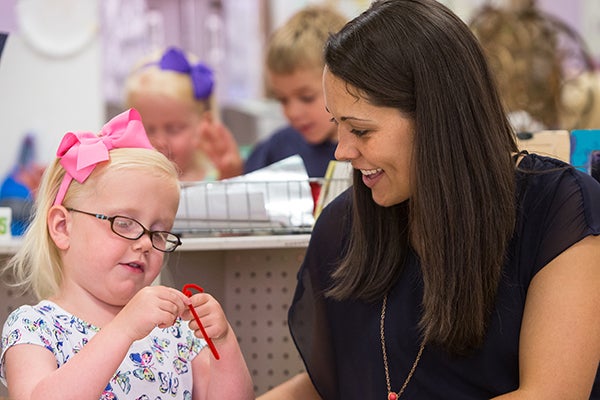Politics and Kids: Experts offer advice on discussing emotions tied to elections

Jessica Pate spends time with Taylor Ainsley at ECU’s Nancy Darden Child Development Center. (File photo taken pre-COVID-19 by Cliff Hollis)
The polarized attitudes surrounding the 2020 election may have lasting effects on children. The amount of negative campaigning, news coverage and even everyday conversations between people has been difficult to conceal from our youngest citizens, according to child development experts at East Carolina University.
Dr. Sheresa Boone Blanchard and Dr. Sandy Lookabaugh, child development experts in ECU’s College of Health and Human Performance and their colleague, Melissa Nolan, director of the Nancy Darden Child Development Center at ECU, offer tips for discussing the outcome of the election with children.
Tip 1: Display good sportsmanship
Whether your candidate wins or loses, it’s an opportunity for adults to display good sportsmanship. Children mirror the emotions and attitudes of their parents, and emotions have run high this year.
“Remain calm. It’s a fact that children respond to how we react and will feed into it. If parents are frustrated, angry or happy about the outcome, it’s OK to identify those feelings and calmly put them into words,” said Blanchard.
Tip 2: Choose your words carefully
Try to remain as neutral as possible when talking about the outcome of the election whether you feel elation or disappointment.
“Children do not have the cognitive ability to rationalize exaggerated comments. If they overhear an adult say ‘the world will end’ if their candidate loses, children believe the world will end,” said Blanchard.
Also, be ready to share information based on the child’s age and developmental level. Sometimes adults may overshare, which can confuse children. “Think about the questions they are asking and share information based on that. It may not be about political parties; it could be more general information so they can understand what is going on and what has happened,” she said.
These kinds of statements can lead to fear and uncertainty. Nolan encourages parents to reassure their children that they are still safe and will be taken care of no matter the outcome.
Tip 3: Be honest
Blanchard and Nolan agree that it’s OK to be honest with your children and share what you are feeling. Give them the space and the opportunity to share their emotions too and ask questions. Ask them how they feel about what they’ve seen and heard.
“Don’t give children more information than what they want,” said Nolan. She suggests encouraging children to ask questions and for adults to stick with short honest answers.
“Adults tend to give too much information,” she added.
Tip 4: Recognize teachable moments
Use opportunities that arise to teach and model tolerance.
“Parents can explain that even though they may not agree with the person in office, we should still respect them and find a way to move on,” said Nolan.
Blanchard said parents can try to find optimism in the situation.
Meet our experts:
Dr. Sheresa Blanchard is an associate professor of human development and family science at ECU. Her research interests include early childhood education, parenting and family-centered practices.
Dr. Sandy Lookabaugh is an associate professor of human development and family science at ECU. Her areas of expertise are positive child guidance, early childhood education, parent-child interactions, human-animal interactions, and death and dying.
Melissa Nolan is the director of ECU’s Nancy Darden Child Development Center, part of the Department of Human Development and Family Science. Her expertise includes best practices in early childhood education and child care administration.